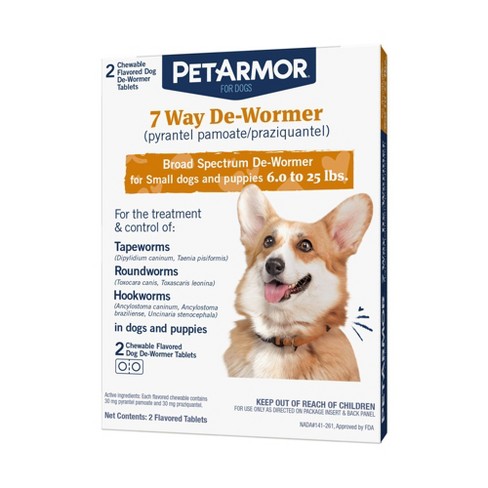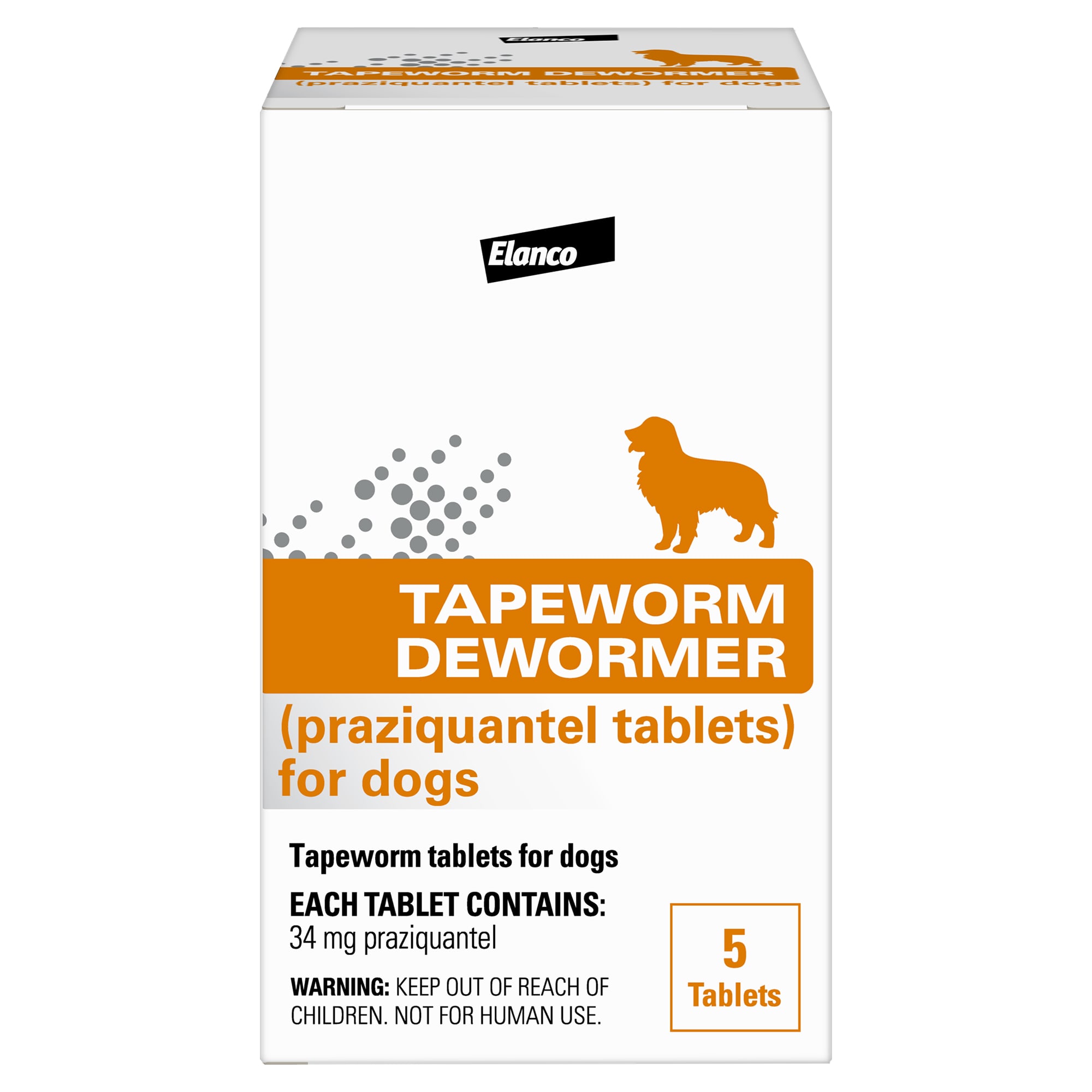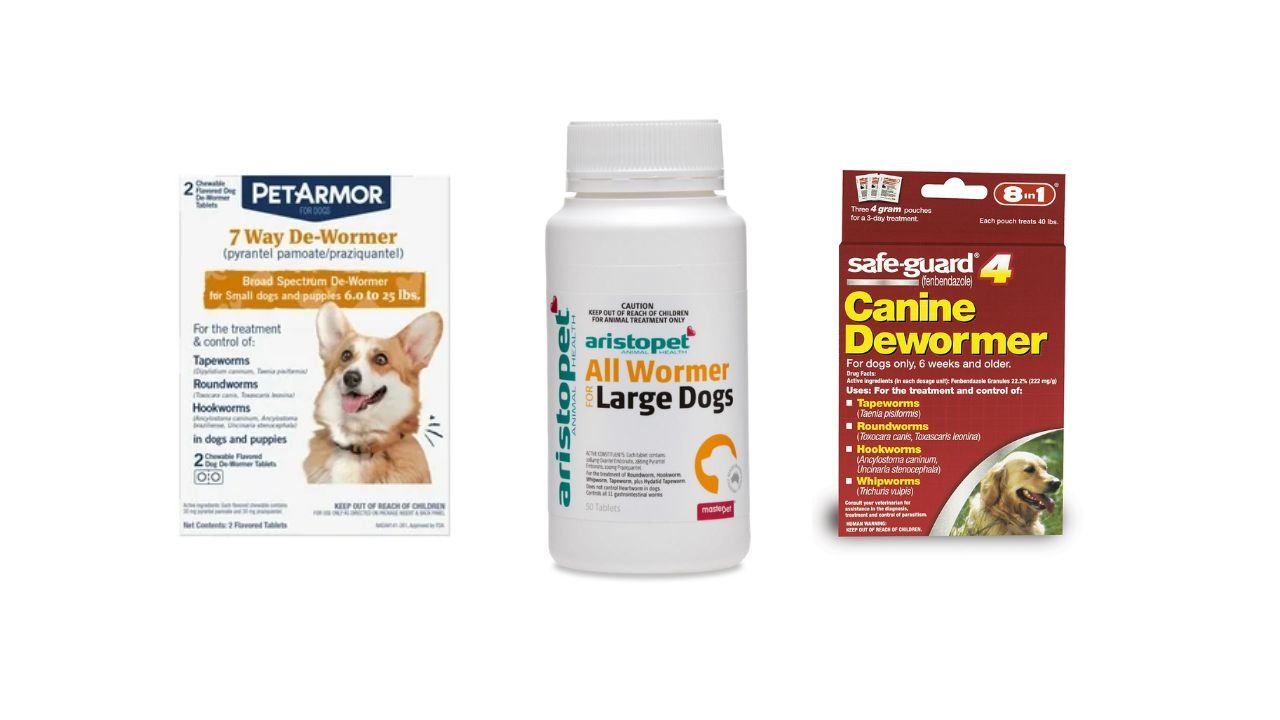Are you looking for effective dog worming medicine? Choosing a safe and reliable option is essential to ensuring your pet’s health.
Worming medicine helps eliminate and prevent intestinal parasite infestations in dogs, such as roundworms, hookworms, and tapeworms. Regular treatment is crucial to keeping your furry friend healthy and happy. When selecting a worming medicine for your dog, consider the type of worms it targets and the form of the medication (e.g.
g., tablets, chewable, or spot-on treatments) and the frequency of administration. Always consult with your veterinarian to determine the best worming medicine for your dog’s specific needs. By prioritizing your dog’s deworming regimen, you can help protect it from the harmful effects of internal parasites.

Credit: www.target.com
Introduction To Worming In Dogs
Introduction to Worming in Dogs:
Why Regular Deworming Is Crucial
Regular deworming prevents health issues and protects your dog from harmful parasites.
Common Types Of Worms In Dogs
Various worms can infect dogs, including roundworms, hookworms, tapeworms, and whipworms.
Recognizing The Signs Of Worm Infestation
Recognizing the signs of worm infestation in dogs is crucial to their health. Worming medicine for dogs helps eliminate these parasites, ensuring your furry friend stays healthy and happy. Regular deworming is essential for preventing potential health issues caused by worms.
Symptoms To Watch For
When it comes to the health of our furry friends, it’s essential to be vigilant and aware of any signs of potential health issues. Worm infestations are a common problem affecting dogs of all ages and breeds. Recognizing the symptoms of a worm infestation can help you take prompt action and ensure the wellbeing of your beloved pet.
Wellbeing comes with vital symptoms to watch for:
- Visible worms in your dog’s feces, vomit, or around their anus
- Unexplained weight loss despite a normal or increased appetite
- Diarrhea or loose stools, sometimes containing blood
- A swollen or distended abdomen
- A dull coat or dry, flaky skin
- Coughing or wheezing, which may indicate the presence of lungworms
- Intense itching or irritation around the anus
- Lethargy or decreased energy levels
If you notice any of these symptoms in your dog, it is essential to take action promptly to prevent further complications.
When To Consult A Vet
While some mild cases of worm infestation can be treated at home, it’s always a good idea to consult a veterinarian for a proper diagnosis and treatment plan. A vet can accurately identify the type of worms affecting your dog and recommend the most suitable worming medication.
You should consult a vet if:
- Your dog is showing severe symptoms or is in distress
- You suspect your dog may have a severe infestation
- Your dog is a young puppy or an elderly dog, as they may be more vulnerable to the effects of worm infestations
- Your dog has a compromised immune system
- You are unsure about the appropriate dosage or method of administering the worming medication
A vet can guide you through the process of deworming your dog and provide you with the necessary advice to prevent future infestations.
Types Of Worming Medications
When keeping our furry friends healthy, ensuring they are protected against worms is crucial to their care routine. Various types of worming medications are available to help prevent and treat worm infestations in dogs. Let’s take a closer look at the different options:
Oral Tablets And Chews
Oral tablets and chews are convenient and effective options for worming your dog. These medications are usually administered directly into the dog’s mouth or can be disguised in their food, making it easier for pet owners to ensure their furry companions receive their necessary treatment. The active ingredients in these tablets and chews work to eliminate different types of worms, providing comprehensive protection for your dog’s health.
Topical Treatments
Topical treatments are applied directly to the dog’s skin, typically at the base of the neck or between the shoulder blades. These medications are absorbed through the skin and distributed throughout the dog’s body, effectively targeting and eliminating internal parasites such as worms. Topical treatments are popular for pet owners who prefer a hassle-free method of administering worming medication to their dogs.
Injectable Options
Injectable options offer an alternative approach to worming medication. Administered by a veterinarian, these injections provide a fast-acting, reliable solution for treating dog worm infestations. Injectable medications are especially beneficial for dogs who may have difficulty with oral or topical treatments, ensuring they receive the necessary medicines to combat worms and maintain their overall wellbeing.
Choosing The Right wellbeingdicine
When it comes to dog worming medicine, selecting the appropriate treatment is crucial. Factors to Consider include the dog’s age, weight, and the type of worms being targeted. Understanding these aspects ensures the medication’s effectiveness.
Factors To Consider
- Age of the dog
- Weight of the dog
- Type of worms
Age And Weight Considerations
Age and weight are significant factors in determining the correct dosage of worming medicine. Puppies may require different treatment than adult dogs. Medication Frequency also plays a crucial role in ensuring the dog’s health.
Medication Frequency
- Follow the veterinarian’s recommended schedule
- Regular treatment helps prevent reinfestation
- Adjust frequency based on the dog’s lifestyle and risk factors
The Process Of Deworming Your Dog
Deworming your dog is essential for their health. Worming medicine for dogs helps to eliminate and prevent internal parasites, keeping your furry friend healthy and happy. Regular deworming is a crucial part of your dog’s healthcare routine.
The Process of Deworming Your Dog
Preparation Steps:
Before you begin deworming your dog, there are a few vital preparation steps. These steps will help ensure the medication’s effectiveness and your furry friend’s safety.
1. Consult your veterinarian: Schedule an appointment to discuss the appropriate deworming medication for your dog. They will consider factors such as your dog’s age, size, and overall health before recommending the most suitable option.
2. Follow instructions: After obtaining the deworming medication, carefully read and follow the instructions. Pay attention to the dosage, frequency, and specific guidelines for administering the drug to your dog.
3. Gather necessary supplies: To make the process smoother, gather all the necessary supplies beforehand. This may include the deworming medication, a syringe or dropper, treats to reward your dog, and any other items recommended by your veterinarian.
Administering the Medication:
Now that you have prepared everything, it’s time to administer the deworming medication to your dog. Follow these steps to ensure proper administration and maximum effectiveness.
1. Choose the right time: Pick when your dog is calm and relaxed. This will make the process less stressful for both of you. Ensure that you have enough time to complete the administration without feeling rushed.
2. Administer the medication: Depending on the type of medication, you may need to mix it with your dog’s food or give it directly. If you use a syringe or dropper, gently place it in your dog’s mouth and administer the correct dosage. Be patient and calm throughout the process.
3. Offer a treat: Reward your dog with a treat and praise after successfully administering the medication. This positive reinforcement will help create a positive association with the deworming process and make it easier in the future.
Post-Treatment Care:
Once the medication has been given, proper post-treatment care is essential for your dog. This will help ensure a successful deworming process and promote your dog’s overall wellbeing.
1. Monitor for sidewellbeingng. Watch for any potential side effects mentioned in the medication instructions. If you notice anything unusual or concerning, contact your veterinarian immediately.
2. Maintain cleanliness: Regularly clean your dog’s living area to prevent reinfestation. Dispose of feces promptly and ensure proper hygiene practices to minimize the risk of worms spreading.
3. Follow-up treatments: Depending on the type of worms your dog has, your veterinarian may recommend follow-up treatments. It’s crucial to adhere to their instructions and complete the entire course of therapy to eliminate the worms effectively.
Remember, deworming is an essential part of your dog’s healthcare routine. Following the preparation steps, administering the medication correctly, and providing appropriate post-treatment care can help keep your furry friend healthy and worm-free.
Managing Side Effects
Using worming medicine for dogs is crucial for protecting your furry friend against parasites and worms. However, like any medication, worming medicine can cause side effects, which can be concerning for pet owners. Properly managing these side effects is essential to ensuring your dog’s wellbeing.
Common Reactions
Some common side effects of worming medicine for dogs include vomiting, diarrhea, loss of appetite, lethargy, and drooling. These symptoms are usually mild and should resolve within a few hours to a day. However, seek immediate veterinary attention if your dog experiences severe symptoms such as difficulty breathing or seizures.
Here are some tips to manage common side effects:
- To reduce the risk of vomiting and nausea, give your dog a small amount of food before administering the medication.
- Provide plenty of water to keep your dog hydrated.
- Monitor your dog’s behavior and appetite closely, and report any concerning symptoms to your vet.
When To Seek Help
If your dog experiences severe side effects or any of the following symptoms, contact your veterinarian immediately:
- Bloody diarrhea or vomit
- Loss of consciousness
- Difficulty breathing
- Seizures or tremors
- Swelling of the face, lips, or tongue
Remember, it is always better to err on the side of caution regarding your dog’s health. If you are unsure about any symptoms, contact your veterinarian for advice.
Natural And Alternative Deworming Solutions
Natural and alternative solutions are gaining popularity when deworming your furry friend due to their effectiveness and safety. These methods offer a gentler approach to managing and preventing worm infestations in dogs without the potential side effects of conventional medications. Let’s explore some of the natural and alternative deworming solutions for dogs.
Herbal Remedies
Herbal remedies for deworming dogs have been used for centuries and are known for their effectiveness in combating intestinal parasites. Some herbs, such as wormwood, clove, and turmeric, have natural anti-parasitic properties. These can be administered in various forms, including tinctures, capsules, or teas, to help expel and prevent dog worms.
Dietary Changes
Dietary changes play a crucial role in natural deworming. In controlled amounts, incorporating raw garlic into your dog’s diet can act as a natural deterrent for intestinal parasites. Additionally, adding pumpkin seeds to their meals can provide a natural deworming effect, thanks to their ability to paralyze and eliminate worms from the digestive tract.
Preventive Measures
Preventive measures are essential in managing and minimizing the risk of dog worm infestations. Regularly cleaning up the yard and pet living areas can help prevent exposure to parasite eggs. Furthermore, maintaining good hygiene, including regular bathing and grooming, can reduce the likelihood of worm infestations.

Credit: www.petco.com
Preventing Future-Worm Infestations
Preventing future worm infestations in your dog is crucial for their health and wellbeing. By taking proacwellbeingiand and incorporating preventive strategies, you can significantly reduce the risk of your furry friend suffering from worm infestations in the future. Here are some effective methods to prevent future worm infestations in dogs:
Regular Health Checks
Regular health checks are essential for monitoring your dog’soverallrwell-beingg, including its susceptibility to worm infestations. Schedule routine check-ups with your veterinarian to assess your dog’s health status and administer necessary preventive treatments.
Hygiene And Cleanliness
Proper hygiene and cleanliness in your dog’s living environment are crucial for preventing worm infestations. Regularly clean your dog’s bedding, toys, and living areas to minimize the risk of exposure to worm eggs and larvae.
Controlling The Environment
Controlling the environment in which your dog spends time is essential for preventing future worm infestations. Minimize exposure to areas where worm infestations are prevalent and implement measures to limit contact with potentially contaminated soil or water sources.
Worming Schedules For Dogs
Maintaining a proper worming schedule is crucial for your dog’s health. Worming medicine helps prevent and treat infestations, ensuring your furry friend stays happy and healthy. Trust the proper worming schedule to keep your dog protected.
As a pet owner, it is essential to understand the importance of worming your dog. Worming medicine is a crucial aspect of dogs’ overall health and well-beingg Worms can cause a range of health problems in dogs, including weight loss, diarrhea, vomiting, and even death if left untreated. Following a working schedule for your dog is crucial to prevent these issues. Let’s take a closer look at the worming schedules for dogs, including puppy deworming timetables and adult dog maintenance.
Puppy Deworming Timetable
Puppies are more vulnerable to worms than adult dogs, so starting their worming schedule early is essential. Generally, puppies should be dewormed every two weeks until they are 12 weeks old, then monthly until they are six months old. After six months, your puppy can switch to an adult dog worming schedule. It is essential to consult with your veterinarian for a specific deworming schedule tailored to your puppy’s needs.
Adult Dog Maintenance
The worming schedule for adult dogs can vary depending on their lifestyle and risk of exposure to worms. Generally, adult dogs should be wormed every three to six months. However, dogs frequently exposed to worms, such as those that hunt or have contact with other dogs, may require more frequent worming. Additionally, pregnant and nursing dogs may need to be wormed more often to protect their puppies.
In conclusion, following a working schedule for your dog is crucial to its overall health and wellbeing. Following a wellbeing schedule and an adult dog maintenance schedule can help prevent various health problems caused by worms. Consult your veterinarian to create a specific worming schedule tailored to your dog’s needs. By caring for your dog’s worming needs, you can ensure they live a happy and healthy life.

Credit: www.amazon.com
Faqs About Worming Dogs
Regular worming is essential for keeping our furry friends healthy and happy. However, dog owners often have questions and concerns about the process. This article will address some of the most common problems and provide expert advice on worming dogs.
Addressing Common Concerns
1. How often should I worm my dog?
Worming frequency depends on various factors, such as your dog’s age, lifestyle, and the type of worming medication you use. Generally, it is recommended to worm adult dogs every three months. However, puppies may require more frequent worming from two weeks to six months old.
2. Can I use the same worming medicine for all worms?
No, different types of worms require specific medications. Most worming medications target common worms such as roundworms, hookworms, and tapeworms. However, it is essential to consult with your veterinarian to determine the proper medication for your dog based on their specific needs.
3. Are there any side effects of worming medication?
In general, worming medications are safe for dogs when used as directed. However, some dogs may experience mild side effects such as vomiting, diarrhea, or lethargy. These symptoms are usually temporary and should resolve on their own. If you notice any severe or persistent side effects, it is best to consult your veterinarian.
Expert Advice
When it comes to working dogs, it is always advisable to seek expert advice from your veterinarian. They can provide specific guidance based on your dog’s health, lifestyle, and medical conditions. Here are a few expert tips to keep in mind:
- Follow the recommended dosage and administration instructions provided by the manufacturer.
- Ensure your dog completes the entire course of treatment, even if they appear worm-free.
- Regularly clean up your dog’s feces to prevent preventreireinfestationdan the spread of worms to other animals.
- Look for any signs of worm infestation, such as weight loss, a dull coat, or a pot-bellied appearance.
- If you have multiple pets, treat all of them at the same time to prevent cross-infection.
By following these expert tips and addressing common concerns, you can ensure your dog stays healthy and worm-free. Remember, prevention is always better than cure, so make worming a regular part of your dog’s healthcare routine.
Frequently Asked Questions
Worming Medicine for Dogs?
Are you looking for effective dog worming medicine? Choosing a safe and reliable option is essential to ensuring your pet’s health.
Can I Deworm My Dog Myself?
You can deworm your dog at home using over-the-counter medications after consulting a vet for guidance.
What Is The Best Dewormer For Dogs?
The best dog dewormer is typically prescribed by a veterinarian based on the specific type of worms.
Can I Treat My Dog For Worms Without Going To The Vet?
No, treating your dog for worms without consulting a vet is not recommended. Over-the-counter medications may not be effective and could potentially harm your dog. A vet can prescribe the appropriate medication and dosage based on your dog’s needs and health history.
How Often Should A Dog Be Wormed?
Dogs should be wormed every three months to keep them healthy and parasite-free. Regular worming is essential for your dog’s wellbeing.
Conclusion
Administewellbeingng medicine to your dog is an essential part of their overall health and wellwell. FFollowingthe aad wellbeingveterinarian and rregularly scheduledcheck-ups, you can ensure that your furry friend is protected from harmful parasites. Remember always to read and follow the instructions on the medication packaging carefully.
With the proper care and attention, your dog can lead a healthy and happy life free from the adverse effects of worms.

Hello I am Farhana I have been doing research on dogs since last 10 years. I have been doing research on dog special parts or dog food since last 10 years. I have gained knowledge about my dog in these ten years so. I want to blog about it daily.

